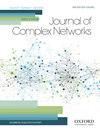属性网络中社区检测的多级生成框架
IF 1.5
4区 数学
Q2 MATHEMATICS, INTERDISCIPLINARY APPLICATIONS
引用次数: 0
摘要
属性网络中的社区检测是复杂网络分析中的重要任务之一。现有的许多方法从生成的角度将网络拓扑与节点属性相结合,将属性网络建模为一个概率生成过程,该过程具有隐变量描述的群体分布。虽然它们可以为社区结构提供很好的可解释性,但由于在推断时计算复杂度高,难以快速推断社区成员。在多级策略的激励下,本研究提出了一种多级生成框架,以减少属性网络中社区检测生成模型的时间成本。我们首先通过节点匹配将一个属性网络粗化成更小的网络。然后,我们在不做任何修改的情况下,在最粗网络上使用现有的生成模型进行社区检测,从而有效地获得这个小型最粗网络中节点的社区隶属度。最后,我们通过局部优化机制将分配映射回原始网络以获得社区。在几个真实世界和人工属性网络上的大量实验表明,我们的基于多层的方法比原始的生成模型要快得多,并且能够获得更好或更具竞争力的结果。本文章由计算机程序翻译,如有差异,请以英文原文为准。
A multi-level generative framework for community detection in attributed networks
Community detection in attributed networks is one of the most important tasks in complex network analysis. Many existing methods propose to integrate the network topology and node attribute from a generative aspect, which models an attributed network as a probabilistic generation process with the community distribution described by hidden variables. Though they can provide good interpretability to the community structure, it is difficult to infer community membership quickly due to their high computational complexity when inferring. Motivated by the multi-level strategy, in this study, we propose a multi-level generative framework to reduce the time cost of generative models for community detection in attributed networks. We first coarsen an attributed network into smaller ones by node matching. Then, we employ the existing generative model on the coarsest network without any modification for community detection, thus efficiently obtaining community memberships of nodes in this small coarsest network. Last, we project the assignments back to the original network through a local refinement mechanism to get communities. Extensive experiments on several real-world and artificial attributed networks show that our multi-level-based method is significantly faster than original generative models and is able to achieve better or more competitive results.
求助全文
通过发布文献求助,成功后即可免费获取论文全文。
去求助
来源期刊

Journal of complex networks
MATHEMATICS, INTERDISCIPLINARY APPLICATIONS-
CiteScore
4.20
自引率
9.50%
发文量
40
期刊介绍:
Journal of Complex Networks publishes original articles and reviews with a significant contribution to the analysis and understanding of complex networks and its applications in diverse fields. Complex networks are loosely defined as networks with nontrivial topology and dynamics, which appear as the skeletons of complex systems in the real-world. The journal covers everything from the basic mathematical, physical and computational principles needed for studying complex networks to their applications leading to predictive models in molecular, biological, ecological, informational, engineering, social, technological and other systems. It includes, but is not limited to, the following topics: - Mathematical and numerical analysis of networks - Network theory and computer sciences - Structural analysis of networks - Dynamics on networks - Physical models on networks - Networks and epidemiology - Social, socio-economic and political networks - Ecological networks - Technological and infrastructural networks - Brain and tissue networks - Biological and molecular networks - Spatial networks - Techno-social networks i.e. online social networks, social networking sites, social media - Other applications of networks - Evolving networks - Multilayer networks - Game theory on networks - Biomedicine related networks - Animal social networks - Climate networks - Cognitive, language and informational network
 求助内容:
求助内容: 应助结果提醒方式:
应助结果提醒方式:


